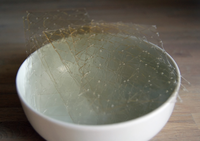
Photo from wikipedia
The encapsulation of cells in microscale hydrogels can provide a mimic of a three-dimensional (3D) microenvironment to support cell viability and functions and to protect cells from the environmental stress,… Click to show full abstract
The encapsulation of cells in microscale hydrogels can provide a mimic of a three-dimensional (3D) microenvironment to support cell viability and functions and to protect cells from the environmental stress, which have been widely used in tissue regeneration and cell therapies. Here, a microfluidics-based approach is developed for continuous encapsulation of mesenchymal stem cells (MSCs) at the single-cell level using alginate microgels. This microfluidic technique integrated on-chip encapsulation, gelation, and de-emulsification into a one-step fabrication process, which enables scalable cell encapsulation while retaining the viability and functionality of loaded cells. Remarkably, we observed MSCs encapsulated in Ca-alginate microgels at the single-cell level showed significantly enhanced osteogenesis and accelerated mineralization of the microgels which occurred only after 7 days of induction. Furthermore, MSCs laden in alginate microgels displayed significantly enhanced bone formation compared to MSCs mixed with microgels and acellular microgels in a rat tibial ablation model. To conclude, the current microfluidic technique represents a significant step toward continuous single cells encapsulation, fabrication, and purification. These microgels can boost bone regeneration by providing a controlled osteogenic microenvironment for encapsulated MSCs and facilitate stem cell therapy in the treatment of bone defects in a minimally invasive delivery way. Statement of significance The biological functions and therapeutic activities of single cells laden in microgels for tissue engineering remains less investigated. Here, we reported a microfluidic-based method for continuous encapsulation of single MSCs with high viability and functionality by integrating on-chip encapsulation, gelation, and de-emulsification into a one-step fabrication process. More importantly, MSCs encapsulated in alginate microgels at the single-cell level showed significantly enhanced osteogenesis, remarkably accelerated mineralization in vitro and bone formation capacity in vivo. Therefore, this single-cell encapsulation technique can facilitate stem cell therapy for bone regeneration and be potentially used in a variety of tissue engineering applications.
Journal Title: Acta biomaterialia
Year Published: 2020
Link to full text (if available)
Share on Social Media: Sign Up to like & get
recommendations!